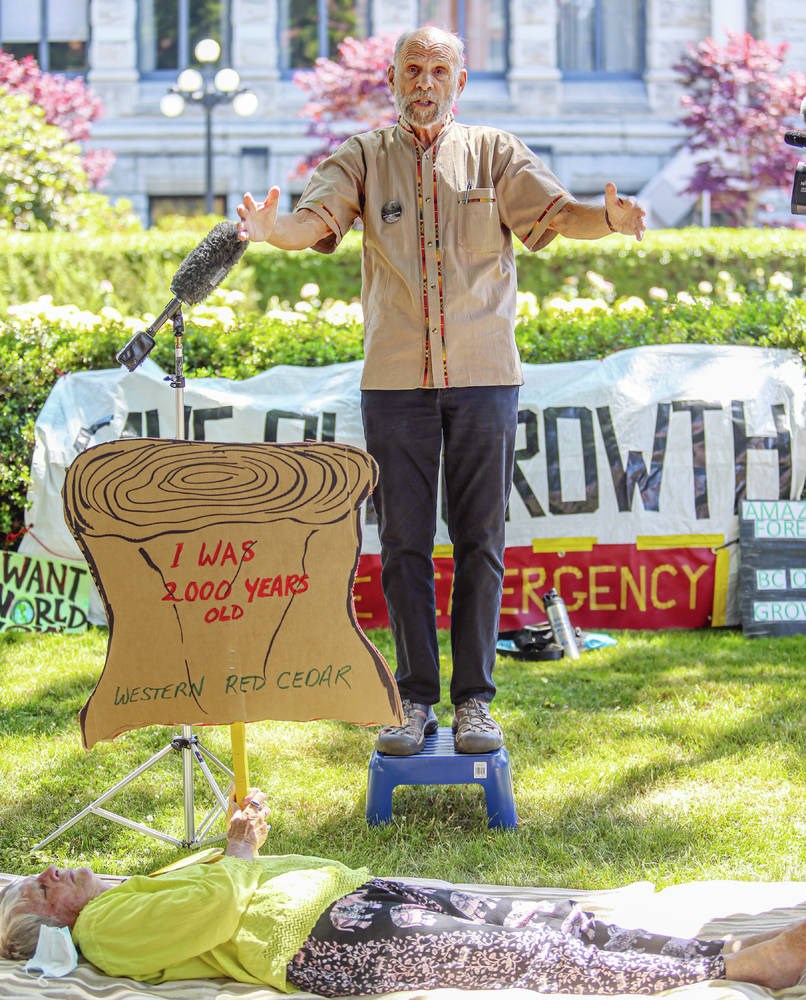Two court decisions Tuesday affirmed the right of both journalists and a seniors’ group to access the Fairy Creek area where people protesting old-growth logging have been arrested for more than two months, lawyers say.
The RCMP have created large exclusion zones for both journalists and the public, with checkpoints blocking the road to vehicles. Journalists have been allowed to drive into the zone with a police escort when one is available, and have generally been kept in specific areas to observe arrests, without the freedom to move to other locations.
A media coalition and a seniors group opposed to old-growth logging separately challenged the RCMP restrictions. Justice Douglas Thompson gave oral remarks on both cases Tuesday.
The media coalition, which includes the Canadian Association of Journalists and media outlets such as The Narwhal and Ricochet Media, had asked the court to add a clause to an existing court injunction granted to forestry company Teal-Jones Group that instructed the RCMP not to interfere with media access without a genuine operational reason.
Thompson indicated in his oral remarks that that application was granted, lawyer Sean Hern said at a news conference Tuesday. Hern represented the coalition on a pro bono basis.
“I am not satisfied that geographically extensive exclusion zones, and associated access checkpoints, have been justified as reasonably necessary in order to give the police the space they need,” the judge said.
“I exercise my discretion to make the order sought by the media consortium, on the basis that in making operational decisions and exercising its discretion surrounding the removal and arrest of persons violating the order, the RCMP will be reminded by the presence of this additional language to keep in mind the media’s special role in a free and democratic society, and the necessity of avoiding undue and unnecessary interference with the journalistic function.”
The judge’s written reasons with a more detailed explanation for his decision are expected to follow in about a week, Hern said. The written reasons will hopefully provide direction to the RCMP on exclusion zones and how journalists should be treated at protest sites, he said.
A second challenge to the RCMP’s restrictions was mounted by a group of seniors called Elders for Ancient Trees, who asked the court to modify the injunction to clarify the Mounties’ discretion in enforcing the order.
The judge declined to add the term requested, lawyer Matthew Nefstead said, but that was in part because he agreed with the group’s argument that the existing order already has in mind the protection of public access and lawful protest.
The judge said the RCMP can arrest and remove people who are violating the order, but their discretion does not extend to blocking access to everyone based on the possibility of future violations of the injunction, Nefstead said.
“We see it as a success, but it remains to be seen exactly how the RCMP will implement it on the ground,” he said.
While the typical process is to withhold a decision until a written reason is ready, Nefstead said, the judge felt it was important to provide direction right away, “because he viewed important liberties as being compromised.”
Sgt. Chris Manseau said Wednesday morning the RCMP is reviewing the oral decision to determine next steps. Once a decision is reached by operational commanders, it will be made public, he said.
Mounties anticipate more clarity on the judge’s expectations once the written decision is released, Manseau said by email.
“When that happens we will also take that opportunity to review and determine if any other steps are necessary,” he said.



